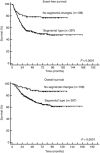Segmental chromosomal alterations have prognostic impact in neuroblastoma: a report from the INRG project
- PMID: 22976801
- PMCID: PMC3494425
- DOI: 10.1038/bjc.2012.375
Segmental chromosomal alterations have prognostic impact in neuroblastoma: a report from the INRG project
Abstract
Background: In the INRG dataset, the hypothesis that any segmental chromosomal alteration might be of prognostic impact in neuroblastoma without MYCN amplification (MNA) was tested.
Methods: The presence of any segmental chromosomal alteration (chromosome 1p deletion, 11q deletion and/or chromosome 17q gain) defined a segmental genomic profile. Only tumours with a confirmed unaltered status for all three chromosome arms were considered as having no segmental chromosomal alterations.
Results: Among the 8800 patients in the INRG database, a genomic type could be attributed for 505 patients without MNA: 397 cases had a segmental genomic type, whereas 108 cases had an absence of any segmental alteration. A segmental genomic type was more frequent in patients >18 months and in stage 4 disease (P<0.0001). In univariate analysis, 11q deletion, 17q gain and a segmental genomic type were associated with a poorer event-free survival (EFS) (P<0.0001, P=0.0002 and P<0.0001, respectively). In multivariate analysis modelling EFS, the parameters age, stage and a segmental genomic type were retained in the model, whereas the individual genetic markers were not (P<0.0001 and RR=2.56; P=0.0002 and RR=1.8; P=0.01 and RR=1.7, respectively).
Conclusion: A segmental genomic profile, rather than the single genetic markers, adds prognostic information to the clinical markers age and stage in neuroblastoma patients without MNA, underlining the importance of pangenomic studies.
Figures


References
-
- Ambros PF, Ambros IM, Brodeur GM, Haber M, Khan J, Nakagawara A, Schleiermacher G, Speleman F, Spitz R, London WB, Cohn SL, Pearson AD, Maris JM (2009) International consensus for neuroblastoma molecular diagnostics: report from the International Neuroblastoma Risk Group (INRG) Biology Committee. Br J Cancer 100: 1471–1482 - PMC - PubMed
-
- Attiyeh EF, London WB, Mosse YP, Wang Q, Winter C, Khazi D, McGrady PW, Seeger RC, Look AT, Shimada H, Brodeur GM, Cohn SL, Matthay KK, Maris JM (2005) Chromosome 1p and 11q deletions and outcome in neuroblastoma. N Engl J Med 353: 2243–2253 - PubMed
-
- Bagatell R, Beck-Popovic M, London WB, Zhang Y, Pearson AD, Matthay KK, Monclair T, Ambros PF, Cohn SL (2009) Significance of MYCN amplification in international neuroblastoma staging system stage 1 and 2 neuroblastoma: a report from the International Neuroblastoma Risk Group database. J Clin Oncol 27: 365–370 - PMC - PubMed
-
- Bown N, Cotterill S, Lastowska M, O’Neill S, Pearson AD, Plantaz D, Meddeb M, Danglot G, Brinkschmidt C, Christiansen H, Laureys G, Speleman F, Nicholson J, Bernheim A, Betts DR, Vandesompele J, Van Roy N (1999) Gain of chromosome arm 17q and adverse outcome in patients with neuroblastoma. N Engl J Med 340: 1954–1961 - PubMed

